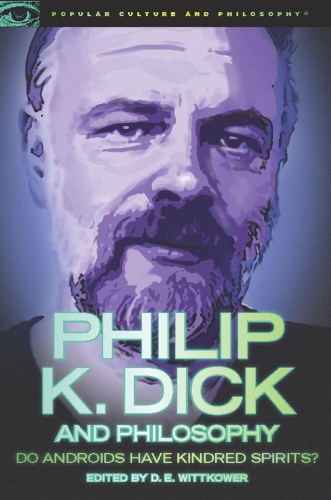
Philip K. Dick and Philosophy: Do Androids Have Kindred Spirits
(Paperback)
Publishing Details
Philip K. Dick and Philosophy: Do Androids Have Kindred Spirits
By (Author) D. E. Wittkower
Open Court Publishing Co ,U.S.
Open Court Publishing Co ,U.S.
1st December 2011
United States
Classifications
General
Non Fiction
Literary studies: c 1900 to c 2000
Popular philosophy
813.54
Physical Properties
Paperback
288
Width 152mm, Height 228mm
510g
Description
Science fiction writer Philip K. Dick (19281982) is the giant imagination behind so much recent popular cultureboth movies directly based on his writings, such as Blade Runner (based on the novel Do Androids Dream of Electric Sheep), Total Recall, Minority Report, and The Adjustment Bureau plus cult favorites such as A Scanner Darkly, Imposter, Next, Screamers, and Paycheck and works revealing his powerful influence, such as The Matrix and Inception. With the much anticipated forthcoming publication in 2011 of volume 1 of Exegesis, his journal of spiritual visions and paranoic investigations, Dick is fast becoming a major influence in the world of popular spirituality and occult thinking.
In Philip K. Dick and Philosophy: Who Adjusts the Adjustment Bureau, twenty Dick fans and professional thinkers confront the fascinating and frightening ideas raised by Dicks mind-blowing fantasies. Is there an alien world behind the everyday reality we experience If androids can pass as human, should they be given the same consideration as humans Do psychotics have insights into a mystical reality Would knowledge of the future free us or enslave us This volume will also include Dick's short story "Adjustment Team," on which The Adjustment Bureau is based.
Philip K. Dick and Philosophy explores the ideas of Philip K. Dick in the same way that he did: with an earnest desire to understand the truth of the world, but without falsely equating earnestness with a dry seriousness. Dicks work was replete with whimsical and absurdist presentations of the greatest challenges to reason and to humanityparadox, futility, paranoia, and failureand even at his darkest times he was able to keep some perspective and humor, as for example in choosing to name himself Horselover Fat in VALIS at the same time as he relates his personal religious epiphanies, crises, and delusions. With the same earnest whimsy, we approach Philip K. Dick as a philosopher like ourselvesone who wrote almost entirely in thought-experiments and semi-fictional world-building, but who engaged with many of the greatest questions of philosophy throughout the Euro-American tradition.
Philip K. Dick and Philosophy has much to offer for both serious fans who have read many of his novels and stories, and for those who may have just recently learned his name, and realized that his work has been the inspiration for several well-known and thought-provoking films. Most chapters start with one or more of the movies based on Dicks writing. From here, the authors delve deeper into the issues by bringing in philosophers' perspectives and by bringing in Dicks written work. The book invites the reader with a casual familiarity with Dick to get to know his work, and invites the reader with little familiarity with philosophy to learn more. At the same time, we have new perspectives and challenging connections and interpretations for even the most hard-core Dick fans, even though we never speak to insiders only.
To maximize public interest, the book prominently addresses the most widely-known films, as well as those with the most significant fan followings: Blade Runner, Total Recall, Minority Report, A Scanner Darkly, and The Adjustment Bureau. Along with these big five films, a few chapters address his last novels, especially VALIS, which have a significant cult following of their own. There are also chapters which address short stories and novels which are currently planned for adaptation: Radio Free Albemuth (film completed, awaiting distribution), The Man in the High Castle (in development by Ridley Scott for BBC mini-series), and King of the Elves (Disney, planned for release in 2012).
Author Bio
D. E. Wittkower is Lecturer of Philosophy at Coastal Carolina University. He is the editor of Facebook and Philosophy, Mr. Monk and Philosophy, and iPod and Philosophy. He lives in Myrtle Beach, SC.
